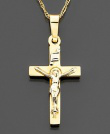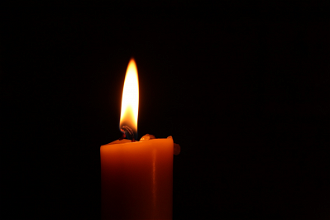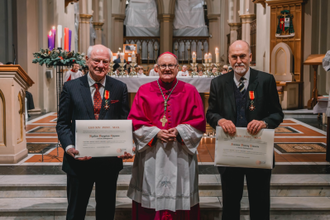European Court permits employee to wear cross but rejects other religious discrimination appeals

History was made today (Tuesday) when the European Court of Human Rights ruled that British Airways employee was entitled to wear a cross at work. In a landmark judgment defining the limits of religious freedom, Nadia Eweida, a practising Coptic Christian, was awarded £1,600 in compensation by the court in Strasbourg after it ruled against the United Kingdom.
In a majority judgment, the ECHR said: "The domestic authorities failed sufficiently to protect the first applicant's right to manifest her religion, in breach of the positive obligation under article 9 [of the European convention on human rights, which guarantees freedom of thought, conscience and religion]."
The court said British courts had failed to balance the competing issues in the case adequately. On the one hand was Eweida's desire to manifest her religious belief; on the other was the employer's wish to project a certain corporate image. "While this aim was undoubtedly legitimate," the judgment said, "the domestic courts accorded it too much weight."
The judges added: "The fact that the company was able to amend the uniform code to allow for the visible wearing of religious symbolic jewellery demonstrates that the earlier prohibition was not of crucial importance."
A second applicant, Shirley Chaplin, a nurse from Exeter who also wanted to wear an exposed cross at work, lost her appeal. The Strasbourg judges unanimously considered that the fact that hospital authorities had asked her to remove the cross for the protection of health and safety and to prevent infections spreading on a ward "was inherently more important". Hospital managers, the judges agreed, "were well placed to make decisions about clinical safety".
Two other Christian applicants: Lilian Ladele, a north London local authority registrar who refused to preside over Civil Partnership ceremonies and Gary McFarlane, a Bristol marriage counsellor, who said, during a training course, that if the situation arose, he could not work with same-sex couples - also said they had suffered religious discrimination but lost their appeals.
Both Islington council and the charity Relate are bound by duties not to discriminate against their clients and therefore could not support staff who refused to work with homosexual couples.
In a dissenting judgment, however, two ECHR judges, Nebojsa Vucinic and Vincent de Gaetano, said Ladele's right to freedom of conscience had been infringed. They said: "No one should be forced to act against one's conscience or be penalised for refusing to act against one's conscience."
They also launched a fierce verbal attack on the culture prevalent in her local authority: "In the third applicant's case, however, a combination of backstabbing by her colleagues and the blinkered political correctness of the borough of Islington (which clearly favoured 'gay rights' over fundamental human rights) eventually led to her dismissal."
The Christian Legal Centre said that the ruling raised questions about the future involvement of Christians in professional and public life.
The Centre said in a statement: "In the case of Gary McFarlane the Court found that his ‘freedom of thought, conscience and religion’ had not been infringed by his employer’s decision to dismiss him – despite the fact that his conscience could have been respected without any risk of others being denied a service to which they were entitled.
"Gary had practised as a relationships counselor for a number of years. Then, during a training course for a new skill, he was prompted to indicate that if the situation ever arose he might have a conscientious objection to providing sex therapy to a same-sex couple on account of his Christian faith.
"He was dismissed for gross misconduct for discrimination on the grounds of sexual orientation, despite the fact that (i) the issue involved a hypothetical scenario and (ii) there was never a risk of anyone being denied a service to which they were entitled (since there were many other counsellors who were willing and able to provide it).
"Article 9 of the European Convention on Human Rights provides strong protections for the 'freedom of thought, conscience and religion'.
"A ComRes poll in 2010 found that 72% of British adults agree that ‘Christians should be able to refuse to act against their conscience without being penalised by their employer’."
Speaking after the judgment, Gary McFarlane said: “I am amazed that the Court has ruled that my ‘freedom of thought, conscience and religion’ was not infringed. There was no need for me to be dismissed. No one was ever denied a service. My conscience could have been accommodated and no one’s rights affected.
“What happened to me was deeply illiberal. I simply wanted to do my job in light of my Christian identity but I was policed and punished for my thoughts, for my beliefs. In a truly tolerant society we make room for one another.
“Today’s judgment is a worrying sign not just for those who bring their Christian faith to bear on their work but for all those who hold viewpoints that differ from the reigning orthodoxy.
“Recent equality legislation has not led to greater respect for difference but to the punishment of difference of opinion. It is not bringing us together but driving us apart and making us afraid to talk about our differences. It’s leading to a fragile and superficial society.”
Andrea Williams, Director of the Christian Legal Centre, said: "It's a great shame that justice has not been done and common sense has not prevailed. Gary's case could have been resolved in a reasonable way. The equality legislation in the United Kingdom has led to some people being more equal than others. This Judgment further entrenches this mindset.
"The European Court had the opportunity to redress the balance but has failed to do so. It is deeply ironic that equality legislation has led to such unequal and unfair treatment of Christians.
"This judgment will make it increasingly difficult for Christians to participate fully in society. Many Christians, motivated by their faith, want to serve others in their professions but they will now be hindered from doing so. Christian faith should not be a bar to office.
"In recent years, we have seen those serving as doctors, nurses, magistrates, teachers and a number of others be barred from doing so on account of their Christian identity."


















